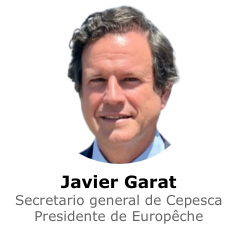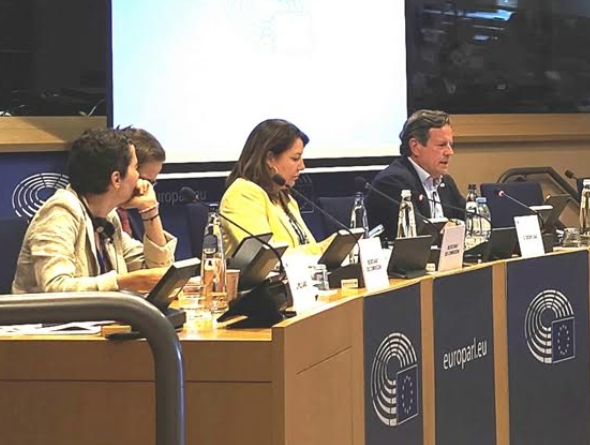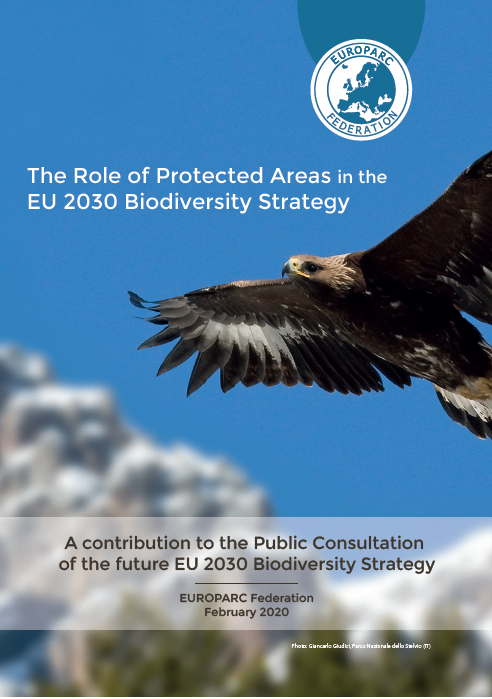|

Javier Garat at the the European Parliament's Committee on Fisheries. Photo: CEPESCA
Javier Garat Urges Holistic Approach to EU Ocean Pact, Prioritizing Sustainability, Economy, and Social Equity
 (BELGIUM, 5/22/2025)
(BELGIUM, 5/22/2025)
Garat, Representing European Fisheries, Stresses Interconnected Challenges and Calls for Balanced Ocean Governance
Brussels –  Javier Garat, Secretary General of Cepesca and President of Europêche, recently presented the "Recommendations of Civil Society for a European Ocean Pact" to the European Parliament's Committee on Fisheries. The opinion, overwhelmingly approved by the European Economic and Social Committee (EESC) in March and for which Garat also served as rapporteur, emphasizes the critical need for a pact that integrates environmental sustainability with economic competitiveness and social equity. Javier Garat, Secretary General of Cepesca and President of Europêche, recently presented the "Recommendations of Civil Society for a European Ocean Pact" to the European Parliament's Committee on Fisheries. The opinion, overwhelmingly approved by the European Economic and Social Committee (EESC) in March and for which Garat also served as rapporteur, emphasizes the critical need for a pact that integrates environmental sustainability with economic competitiveness and social equity.
Garat highlighted the severe, interconnected economic, social, and environmental challenges currently facing European coastal communities. He cited impacts from Brexit, the war in Ukraine, and increasingly frequent extreme weather events, which have led to higher energy and raw material prices, pushing the European blue economy "to the limit." He further pointed out that an escalating regulatory burden and excessive bureaucracy continue to hinder the sector's competitiveness.
From a social perspective, Garat warned of an aging coastal population, youth migration, and a shortage of skilled labor as direct threats to the viability of socioeconomic structures in coastal regions.

Environmental and Regulatory Reforms Advocated
On environmental matters, Garat reiterated the necessity of maintaining healthy, resilient, and productive seas, crucial for preserving natural resources like fishing grounds. He urged the European Union (EU) to evaluate and revise its policies where necessary, particularly concerning the Common Fisheries Policy (CFP). The EESC believes that the 30x30 commitment (to protect 30% of marine areas by 2030) must be effectively implemented, both through the creation and management of marine protected areas and through other effective conservation measures in fishing areas (known as OECMs).
 Garat also stated that the EESC advocates for the implementation of strict protection zones derived from the EU Biodiversity Strategy for 2030, provided they are supported by scientific recommendations. He stressed that closures should be conducted on a case-by-case basis, considering regional specificities and ensuring a balance between conservation and economic activity. In this context, the opinion recalls that the Paris Agreement (Article 2) mandates that these objectives must be implemented in a manner that does not threaten food production. Garat also stated that the EESC advocates for the implementation of strict protection zones derived from the EU Biodiversity Strategy for 2030, provided they are supported by scientific recommendations. He stressed that closures should be conducted on a case-by-case basis, considering regional specificities and ensuring a balance between conservation and economic activity. In this context, the opinion recalls that the Paris Agreement (Article 2) mandates that these objectives must be implemented in a manner that does not threaten food production.
Regarding the opinion's main proposals, Garat listed measures such as urgent legislative simplification (a 25% reduction in regulatory burden, and 35% for SMEs), boosting investment and innovation in sustainable technologies, and creating an Industrial Alliance for Blue Economy Value Chains. He also advocated for strengthening the EU's strategic autonomy in key sectors like food and energy.
Focus on "Blue Foods" and Fair Competition
In the realm of fisheries and aquaculture, the rapporteur called for the development of a European Action Plan for "blue foods" by 2026. This plan aims to promote healthy diets with a low carbon footprint and reduce reliance on unsustainable imported products. He also demanded improved controls on these imports to ensure fair competition and global sustainability within the sector.
.png) Garat supported the European Commission's recent creation of the Partnership for Energy Transition in fisheries and aquaculture, viewing it as an opportunity to modernize the fishing fleet towards a more efficient and sustainable model. Garat supported the European Commission's recent creation of the Partnership for Energy Transition in fisheries and aquaculture, viewing it as an opportunity to modernize the fishing fleet towards a more efficient and sustainable model.
Concerning European funding, the Committee urged an increase in the European Maritime, Fisheries and Aquaculture Fund (EMFAF) in the upcoming budgetary framework and called for a specific budget line for the blue economy within the program succeeding Horizon Europe.
Garat also emphasized the importance of investing in the development of specific capacities and skills for the blue economy and fostering youth engagement in coastal communities. Training and certification in the maritime, recreational, and fishing sectors should be harmonized, ensuring mutual recognition of certificates across the EU to facilitate labor mobility and enhance sector competitiveness.
Addressing pollution and marine litter, Garat mentioned that the EESC opinion recommends strengthening European regulation against land-based sources of marine pollution, such as industrial discharges and wastewater, which introduce organic, chemical, and pharmaceutical contaminants, as well as microplastics and pellets, into aquatic ecosystems.
Finally, Garat reiterated the critical need to revise the current Common Fisheries Policy (CFP). "It is necessary to evaluate whether it responds to new challenges, guarantees a real balance between biodiversity, food security and economic sustainability, and adapts its instruments to a constantly transforming reality," he concluded.
[email protected]
www.seafood.media
Information of the company:
|
Address:
|
Calle de Velázquez, 41, 4 C
|
|
City:
|
Madrid
|
|
State/ZIP:
|
(28001)
|
|
Country:
|
Spain
|
|
Phone:
|
+34 914 323 489
|
|
Fax:
|
+34 914 355 201
|
|
E-Mail:
|
[email protected]
|
More about: 
|
|
|
|



